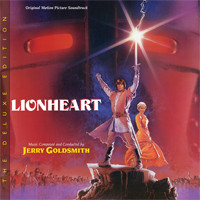- Composed by Jerry Goldsmith
- Varèse Sarabande / 83m
Franklin Schaffner’s directorial career had been on a downward spiral for a while when he made Lionheart, his penultimate film. It was a bit of a disaster all round, released in cinemas very briefly in Canada but nowhere else, finally surfacing on home video later on to very negative reviews. The film is very loosely based on the real-life 14th century children’s crusade, with a young knight (played by Eric Stoltz) leading a group of children as part of King Richard the Lionheart’s Third Crusade; nasty Gabriel Byrne however wants to enslave them.
Schaffner was one of composer Jerry Goldsmith’s most important directorial collaborators and indeed his most prolific – this was their seventh and final film together. And while it may not have been inspiring to many, that didn’t stop Goldsmith from writing a grand and ambitious score, full of great themes.

Chief among them is Robert’s theme, stirring and noble and one of my Goldsmith favourites. It’s built from a three-note motif that the composer uses throughout the score – in its earlier incarnations it tends to be presented warmly, with strings dominated (such as in the early cue “The Ceremony”) but it grows as the score goes on, before its rousing performance for the second half of the epic finale “King Richard” presents it at its most stunning. Even though the film was a failure Goldsmith took that version of it and used it as the final piece in most of his concert appearances for several years.
There’s action music aplenty – in the most expansive variant on the composer’s signature rhythmic style – with very colourful brass writing a highlight. Cues like “Failed Knight”, “The Circus” and “The Banner” are real barnstormers. The latter features an exceptional moment as the B-section of Robert’s theme bursts out from the horns and trumpets, its first appearance in the score and what an appearance it is. A dastardly theme for Byrne’s character can often be heard in these sequences – it sounds like a kind of variant on the dies irae, and gets its fullest presentation in the spectacular “Children in Bondage”. “Forest Hunt” is a grand, eight-minute action/adventure showpiece which rattles through many of the score’s themes; and later “Final Fight” is everything you hope it will be.
A lilting love theme receives its fullest performance in “Robert and Blanche” – tender, touching and memorable, it really is a delight. Also on the softer side is “Mathilda”, based on a soaring, ever-rising melody – a warm-hearted, stirring theme. The final big theme is a kind of “travelling theme”, heard fully in “The Road from Paris”, where it alternates with Robert’s theme – it’s an up-tempo, delightful creation with a really fluid energy to it.
So, it’s all great, in other words. But there is an elephant in the room. Goldsmith recorded a few scores in Budapest in the second half of the 1980s and Lionheart is one of them – the orchestra, styled as The Hungarian State Opera Orchestra, does not provide what may be considered a reference-quality performance. While very rich and multi-thematic, Goldsmith’s music is not as complex as he often wrote – perhaps with the orchestra’s likely limitations in mind – and even so it just isn’t well-performed at all. Adding to that, there’s a large electronic presence and unusually, the composer doesn’t just augment the orchestra to extend the sound palette (as he did so spectacularly for Legend around the same time), at times keyboards are leading the melody and replacing what could have been done by the orchestra – it sounds a bit odd at times (and certainly anachronistic).
Other than that, it’s first-rate. Goldsmith actually didn’t do this type of leitmotivic music very often, building things up from multiple themes associated with specific characters – and the way he brings all those themes together is just great. You have to learn to live with the performance and electronics (those of us who’ve been listening to this score for decades have certainly done that by now). The score had two separate albums released at the time (very early releases by Robert Townson, who of course went on to become the most prolific soundtrack producer in the world and one of Goldsmith’s great champions) and then later a single CD release which featured the best hour of the score.
This new album includes a couple of short, previously-unreleased cues (both of which offer nice variants on familiar themes) and apart from those two, the sound quality is excellent. It’s a spectacular score, full of stirring music written by Hollywood film music’s apex practitioner, and to that end I couldn’t recommend it more highly. It’s usually compared with First Knight but the scores are nothing alike, really; other than being stunning, that is. Whether it’s worth the upgrade if you already have the two original volumes is I guess open to debate, but if you don’t then rush out and get it.
Rating: *****
facebook.com/moviewave | twitter.com/MovieWaveDotNet | amazon.com












I totally agree with your review James. I’ve had this score since 1987. The two LPs, then the two CDs and now this Deluxe edition. I agree with your comments about the performance of the orchestra and the electronics, but after 34 years, the pro’s have always outweighed the cons. Fabulous score.
I FINALLY got mine after Varese had a printing error and couldn’t possibly send out any more CDs with the wrong album text no one cares about and I can finally hear what people were talking about in this score. I had the “Best Of” CD and nothing really clicked with me. The improved sound and presentation of the complete score changed my mind a great deal. It’s in the running with the complete Matrix score for best album release of 2021.